On March 11, 1861, delegates from Alabama, Florida, Georgia, Louisiana, South Carolina, and Texas gathered in Montgomery, Alabama. Their purpose: to ratify the Constitution of the Confederate States of America. The document was–not unsurprisingly–similar to the US Constitution, even using some of the same language.
But the Confederate Constitution gave the states much more autonomy and power than the central government. For example, while a presidential item veto existed, states had to consent to the use of any funds or resources by the federal government. The Confederate Constitution also set six-year terms for the president and the vice presidents, and precluded the president from serving two consecutive terms. And slavery was “recognized and protected” in all slave states and territories, while foreign slave trade remained illegal.
Both France and Great Britain considered entering the fray on the side of the Confederates. But they never acknowledged the Confederate States of America as its own independent, autonomous entity, and the Confederate States crumbled in April 1865.
A Selection of Confederate Literature
For collectors of Americana, the Civil War is a perennially popular area of focus. Within that specialization, the depth and breadth of material available makes it possible to further specialize in a sub-section of Civil War literature. The works and records of the Confederacy offer a fascinating, enlightening, and sobering look into one of the bloodiest periods in American history. Even this sub-specialty has incredible scope, stretching to include works written both before and long after the war itself.
The Italian Bride
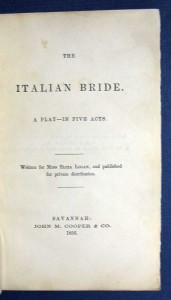 Samuel Yates Levy wrote this play in honor of Eliza Logan and had it printed for private distribution in 1856. Logan was a popular actress in the mid-nineteenth century, and her father, Cornelius Logan, acted as her manager until his death in 1853. Though Logan was born in Philadelphia, she made her name in the antebellum South, with many lucrative engagements in cities like Savannah. Meanwhile, Levy would go on to become a Confederate officer during the Civil War, slightly unusual because he was Jewish. Research indicates that this volume’s recipient was a fellow officer from Georgia. Details>>
Samuel Yates Levy wrote this play in honor of Eliza Logan and had it printed for private distribution in 1856. Logan was a popular actress in the mid-nineteenth century, and her father, Cornelius Logan, acted as her manager until his death in 1853. Though Logan was born in Philadelphia, she made her name in the antebellum South, with many lucrative engagements in cities like Savannah. Meanwhile, Levy would go on to become a Confederate officer during the Civil War, slightly unusual because he was Jewish. Research indicates that this volume’s recipient was a fellow officer from Georgia. Details>>
Great Expectations
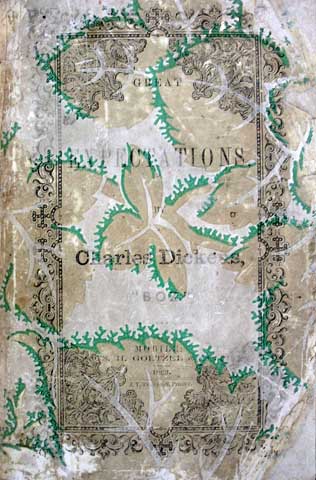 Dickens’ first visit to America ended less than well. The legendary author returned to Britain and published two American Notes, which criticized the United States, most notably for permitting the institution of slavery. (He further alienated American readers with Martin Chuzzlewit.) Dickens’ strong opposition to slavery and his keen sensitivity to social injustice made him an unlikely ally of the Confederacy. But after a close reading of James Spence, who was not only a writer for the London Times, but also a pro-South merchant, Dickens revised his opinion. In All the Year Round, he spoke out in defense of the South on the subject of the Morrill Tariff, noting that the ariff had “severed the last threads that bound the North and South together.” This first Confederate edition of Great Expectations is exceedingly rare in the trade, with no copies having come to auction in the past thirty years. Details>>
Dickens’ first visit to America ended less than well. The legendary author returned to Britain and published two American Notes, which criticized the United States, most notably for permitting the institution of slavery. (He further alienated American readers with Martin Chuzzlewit.) Dickens’ strong opposition to slavery and his keen sensitivity to social injustice made him an unlikely ally of the Confederacy. But after a close reading of James Spence, who was not only a writer for the London Times, but also a pro-South merchant, Dickens revised his opinion. In All the Year Round, he spoke out in defense of the South on the subject of the Morrill Tariff, noting that the ariff had “severed the last threads that bound the North and South together.” This first Confederate edition of Great Expectations is exceedingly rare in the trade, with no copies having come to auction in the past thirty years. Details>>
Carrie Bell
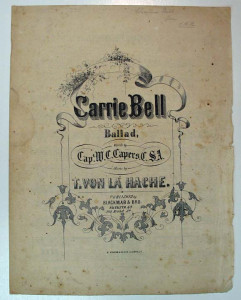 Captain MC Capers wrote the lyrics to the Confederate tune “Carrie Bell,” while T. Von La Hache composed the musical accompaniment. Capers was formerly of the “Macon Volunteers” and had also participated in the Indian Wars in Florida (1836). During the Civil War, Capers was in command of Company G, 1st LA Heavy Artillery Regiment of the CSA. In July 1863, he was promoted to major, seeing service at Vicksburg and elsewhere in the South. Details>>
Captain MC Capers wrote the lyrics to the Confederate tune “Carrie Bell,” while T. Von La Hache composed the musical accompaniment. Capers was formerly of the “Macon Volunteers” and had also participated in the Indian Wars in Florida (1836). During the Civil War, Capers was in command of Company G, 1st LA Heavy Artillery Regiment of the CSA. In July 1863, he was promoted to major, seeing service at Vicksburg and elsewhere in the South. Details>>
A Legal View of the Seizure of Messrs Mason and Slidell
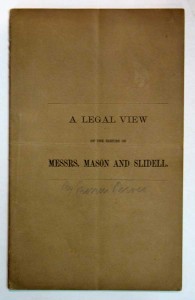 Though this pamphlet was published under the pseudonym “Pro Lege,” it’s thought to be the work of Virginia statesman Francis Rives. He delves into the issues regarding seizure at sea during the US Civil War. The matter came the the forefront when Captain Wilkes, acting on his own cognizance, boarded the British vessel Trent and took two individuals, Mason and Slidell, captive. The two were acting as Confederate diplomats. Wilkes’ bold move was locally applauded, but the British were indignant and on the verge of entering the war against the Union forces. Seward released the two gentlemen and told the British that Wilkes had erred and acted without proper authority. Published in 1861, this pamphlet looks at the diverse international maritime legal issues and the ramifications of Wilkes’ act. Details>>
Though this pamphlet was published under the pseudonym “Pro Lege,” it’s thought to be the work of Virginia statesman Francis Rives. He delves into the issues regarding seizure at sea during the US Civil War. The matter came the the forefront when Captain Wilkes, acting on his own cognizance, boarded the British vessel Trent and took two individuals, Mason and Slidell, captive. The two were acting as Confederate diplomats. Wilkes’ bold move was locally applauded, but the British were indignant and on the verge of entering the war against the Union forces. Seward released the two gentlemen and told the British that Wilkes had erred and acted without proper authority. Published in 1861, this pamphlet looks at the diverse international maritime legal issues and the ramifications of Wilkes’ act. Details>>
General Orders No 30
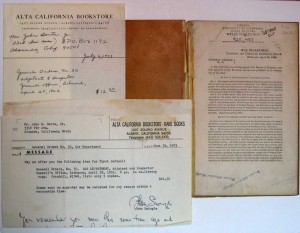 Containing “An Act to Organize Bands of Partizan (sic) Raiders” and “An Act to Further Provide for the Public Defence,” this document was published in April 1862 by the Confederate War Department. It authorized the president “to call out and place in the military serve of the Confederate States, for three years, unless the war shall have been sooner ended, all white men who are residents of the Confederate State, between the ages of 18 and 35 years old.” Details>>
Containing “An Act to Organize Bands of Partizan (sic) Raiders” and “An Act to Further Provide for the Public Defence,” this document was published in April 1862 by the Confederate War Department. It authorized the president “to call out and place in the military serve of the Confederate States, for three years, unless the war shall have been sooner ended, all white men who are residents of the Confederate State, between the ages of 18 and 35 years old.” Details>>
Life of General Stand Watie
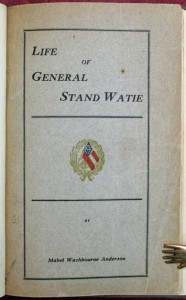 The only Indian brigadier in the Confederate Army and the last Confederate general to surrender, Stand Watie was no stranger to conflict. Long before the war, Watie and his brother, Elias Boudinot, had published the Cherokee Phoenix. Watie also acted as a signatory to the 1835 Treaty of New Echota, which called for the removal of the Cherokee people from Georgia to “Indian Territory” (which eventually became Oklahoma). During the Civil War, Watie consistently distinguished himself in battle, refusing to surrender until June 23, 1865. His grandniece wrote the biography Life of General Stand Watie. The first edition is rare in the trade; only one other copy has come to market in the last fifteen years. Details>>
The only Indian brigadier in the Confederate Army and the last Confederate general to surrender, Stand Watie was no stranger to conflict. Long before the war, Watie and his brother, Elias Boudinot, had published the Cherokee Phoenix. Watie also acted as a signatory to the 1835 Treaty of New Echota, which called for the removal of the Cherokee people from Georgia to “Indian Territory” (which eventually became Oklahoma). During the Civil War, Watie consistently distinguished himself in battle, refusing to surrender until June 23, 1865. His grandniece wrote the biography Life of General Stand Watie. The first edition is rare in the trade; only one other copy has come to market in the last fifteen years. Details>>
The Princess of the Moon: A Confederate Fairy Story
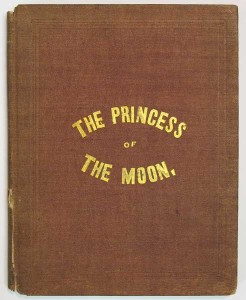 “‘I am the Fairy of the Moon,’ said she, ‘and having witnessed your grief I desire to serve you. What would you have?'”
“‘I am the Fairy of the Moon,’ said she, ‘and having witnessed your grief I desire to serve you. What would you have?'”
The Princess of the Moon is a relatively scarce juvenile with strong fantasy elements. The bias of the author, Cora Semmes Ives, is obvious, and she clearly wanted the Civil War to end differently. Published in 1869, this volume illustrates that Confederate sympathies certainly didn’t dissolve with the Confederacy. OCLC records three institutional holdings, though we found a few additional ones. Details>>
John Brown and Wm. Mahone
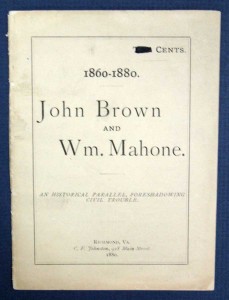 Written by George W Bagby in 1880, this pamphlet’s half-title is “An Historical Parallel, Foreshadowing Civil Trouble.” The political tract, anti-Grant and anti-Malone, was issued during Malone’s 1880 run for US Senator for Virginia. Bagby proposes an odd connection among Grant, Mahone, and Confederate guerilla John S Mosby. He also predicts a civil war worse than that of the early 1860’s. “Miserable South!…despised by all the world, and for no crime but that you Christianized a race of savages thrust upon you by mercantile greed–how sad is your fate!” Details>>
Written by George W Bagby in 1880, this pamphlet’s half-title is “An Historical Parallel, Foreshadowing Civil Trouble.” The political tract, anti-Grant and anti-Malone, was issued during Malone’s 1880 run for US Senator for Virginia. Bagby proposes an odd connection among Grant, Mahone, and Confederate guerilla John S Mosby. He also predicts a civil war worse than that of the early 1860’s. “Miserable South!…despised by all the world, and for no crime but that you Christianized a race of savages thrust upon you by mercantile greed–how sad is your fate!” Details>>
The James Boys in Arkansas; or, After Confederate Gold
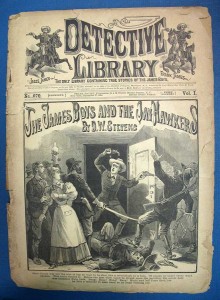 The concept of Confederate plunder was a popular one that survived the end of the Civil War. It inspired this 1895 dime novel, which plays on the notion that Confederate rebels had hoarded ill-gotten wealth. According to Bragin’s Dime Novels Bibliography, author Frank Tousey “practically revolutionized the dime novel field…[and here in the Detective Library was] the finest James Boys stories. The second title proves but a teaser, comprising only three pages of text and informing readers that the entire tale can be found in Issue No. 671. This is considered a scarce title of outlaw fiction; OCLC records only one institutional holding. Details>>
The concept of Confederate plunder was a popular one that survived the end of the Civil War. It inspired this 1895 dime novel, which plays on the notion that Confederate rebels had hoarded ill-gotten wealth. According to Bragin’s Dime Novels Bibliography, author Frank Tousey “practically revolutionized the dime novel field…[and here in the Detective Library was] the finest James Boys stories. The second title proves but a teaser, comprising only three pages of text and informing readers that the entire tale can be found in Issue No. 671. This is considered a scarce title of outlaw fiction; OCLC records only one institutional holding. Details>>

